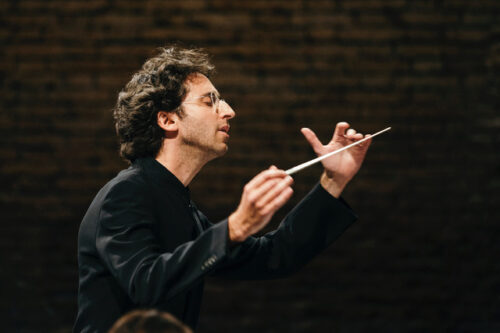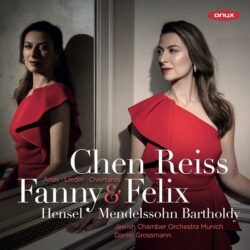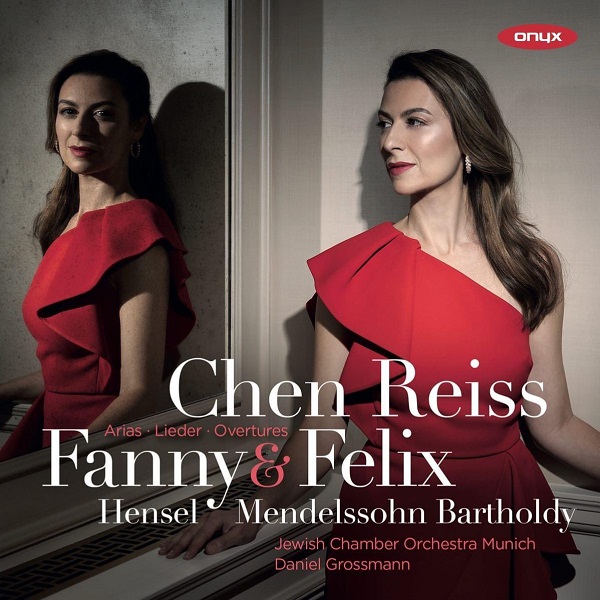Interview with Daniel Grossmann, founder, conductor and artistic director of the Jewish Chamber Orchestra Munich

Antoine Lévy-Leboyer (ALL): How did you start the Jewish Chamber Orchestra Munich?
Daniel Grossmann (DG): So, I had this idea in 1999. I was 21 years old.
I grew up in Munich and did not like the way the Jewish community worked here. It was always somehow run by the fear that it could be dangerous being Jewish in Germany. At that time, the Jewish synagogue was really in a back courtyard. And nobody knew that in the house in front of the synagogue there was the Jewish community center.
For me, it was different. I told everyone that I am Jewish and that it was really an important part of my identity. So, I thought, as a musician, I could make an orchestra that would bring the Jewish culture to the people.
Originally, I wanted to make this orchestra out of young musicians from the Jewish community center and maybe I was too young and there weren’t enough musicians so the whole plan didn’t work out. Then in 2004, when the new synagogue and the new community center in the Sankt-Jakobs-Platz were already planned and starting to be built, the Jewish community came to me and asked if I would like to somehow bring back this idea and found this orchestra.
And then I said, yeah, it could be interesting. But at that time, I had already worked with professional musicians and professional orchestras, so I said that the orchestra has to be professional and that the first idea performance should be an opera because it’s nice to make something big. So, we played an opera by Philip Glass: The Fall of the House of Usher.
That was the starting point. And from then on, the whole thing developed really fast.
ALL: I think you mentioned this a few times, the musicians of the orchestra are a mix of Jewish and non-Jewish members.
DG: Absolutely. I have always said I’m not interested that there be Jews playing in the orchestra. It’s nice if there are Jewish musicians but that’s not my main goal. We are not a ghetto orchestra. It’s more about musicians who are interested in Jewish culture.
And there are so many musicians who have become so fond of Jewish culture and are so interested in the whole project, the orchestra, the music that we play, and also the Jewish culture and the Jewish religion.
ALL: When I attended the concert this summer, the variety of music was very wide. I was really impressed. Is there a way to define Jewishness in music or is it just the fact that there are quite a lot of good, original Jewish composers?
DG: There are interesting Jewish composers in every epoch of music history. But it is also the special way that I choose the program. Because I am not only interested in the music of Jewish composers, but also composers who are non-Jewish but write music about, let’s say, a story from the Bible or some other topic related to Jewish culture, Jewish religion.
ALL: But I mean, when I look at the repertory, there are some cantors singing in their specific styles. You have played Mendelssohn. And, as you and I discussed, you’ve also made wonderful discoveries of the music of his sister Fanny. When I look at the archives of the orchestra, there seems to be a very large number of Jewish composers.
DG: Yeah, absolutely.
ALL: I have been to two concerts and have discovered so many jewels that I did not know. When I look at the programs, I know now that I trust you even though I do not know the works. So how do you find them?
DG: I am not a musicologist. I do not spend time in libraries and archives. I cannot really tell you how I find them. It is often by chance. People tell me about such pieces. or I find a name in a book that I did not know before. Then I start to dig deeper. There is no method. It is a trial-and-error process.
Take the example of Mieczysław Weinberg. There are some pieces which are played regularly. We recorded his Concertino for Violin. There is a recording by Gidon Kremer but it is never played in concerts.
There is the musicologist Michael Haas. He was the producer of the series ‘Entartete Musik’. He told me 15 years ago that he would not choose a piece for this series just because it was written by a Jewish composer. He always chose a piece because he felt that it was good and important music. This is the same for me. I am looking for pieces where I am 100% sure I like the piece and that it is important to perform. There is so much of the literature to be played.
ALL: We look forward to all these discoveries.
DG: And this is why I changed my work. Of course, we love Beethoven and Brahms and to conduct their music. But why do we have to play their pieces over and over again?
Once again, Weinberg wrote 21 symphonies. There are at least five worth performing in every hall. The 21st, for example, Kaddish, is a wonderful piece. It is never performed and I do not understand why.
ALL: The only work we may know of Weinberg is the Cello Concerto.
DG: I just played the Concertino, which is an earlier version, on a tour in Germany. It’s shorter and for string orchestras and solo cello. It is such beautiful and deep music. Nobody knew it.
ALL: Also when you perform, you give short introductions and I always learn something. So you have done a bit more research than you say…
DG: Of course, if there is a composer I am really convinced his or her music is important, then I do my research and try to find out about them in depth. We never play a piece because we feel it will fill the hall. There has to be an idea behind why we combine these pieces. Then I say something about the music, it is important that they hear things about the music they do not know as well as the background of the composers.
ALL: You play mostly in Munich, but you also have toured a lot.
DG: We tour almost around the whole world. We’ve been to China, to the United States, to Sweden, many times in Vienna but also throughout Germany. On the 28th of October we started a tour throughout Germany, we’ll be in Hamburg and Cologne and Dusseldorf and Chemnitz, Berlin, Bielefeld, Stuttgart. So we do play in a lot of different places.

ALL: I think an album of Fanny Mendelssohn is on the way. Can you talk about this?
DG: Yeah, I did a recording together with Chen Reiss. It was her idea that we record different pieces by Fanny. So, we recorded this cantata that we played in that concert, Hero and Leander, and eight songs which were arranged for the orchestra by an Israeli composer. But we also recorded the very, very first version of the Hebrides Overture by Mendelssohn and ‘Infelice’, a cantata, which is very rarely played, in the original version for solo violin, soprano, and orchestra.
ALL: You traditionally have a concert at the end of October.
DG: This is our Jewish New Year’s concert that we play every year. The idea was to find a concept about the High Holidays. It’s funny because the Jewish New Year is completely different than the first of January. And of course, it’s this link to the New Year’s concerts in Vienna and Berlin and around the world.
We always invite two cantors. This year we had two young cantors from Israel and we played synagogue music. And I explained something about the High Holidays and also about the pieces that we play and about cantorial music.
ALL: While there will be uncertainties about the season due to the pandemic, can you tell us about the highlights of the coming year?
DG: Of course there are many highlights, but there are two concerts I am looking forward to very, very much. The one in April at Munich’s Cuvillies Theater when we will present music by the Mendelssohn family and Chen Reiss will return to Munich. It is always completely different when you have worked on a recording to perform the pieces live in front of an audience.
The other one features music by Weinberg, one of my favorite composers, along with Shostakovich, who was such a great friend and influence on Weinberg. We will play this in Utopia, which is a wonderful place in Schwabing. Last year we recorded the Concertino for Violin with a wonderful young violinist, Tassilo Probst, when he was 19 years old. He has such deep feelings. When he plays the music, you think he must be 60 or 70.
ALL: There are quite a lot of documents on the internet. Which would you recommend we listen to? Or can you give a sense of what there is which we should explore and listen to?
DG: The first composer that comes to my mind is Arthur Lourié. He is a composer no one knows. We recorded some string music from him which are marvelous pieces. Another would be Leo Weiner. Nobody knows his music outside of Hungary. We played a divertimento he wrote, which is wonderful music in the style of Brahms’s Hungarian Dances.
So many pieces, and still nobody knows the early Lieder of Gustav Mahler. They are marvelous.
And then also, the synagogue music. It is so important to record these pieces. So many people love these works, even some who have never been in a synagogue.
Antoine Lévy-Leboyer
The web site of the Jewish Orchestra Munich click here.
The YouTube Channel of the JCOM click here.
(Interview edited for clarity by Antoine Lévy-Leboyer)
